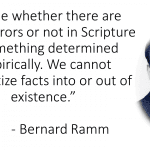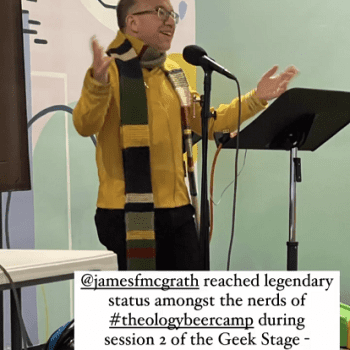I hope that at least some readers picked up on the pun in the title. Yes, this post will be not only about mainline Christian denominations and comments related to their declining numbers in recent years, but also about science fiction. I haven’t read James Corey’s series of novels on which the TV show The Expanse is based. And so I don’t know how much difference there may or may not be between the two with regard to the things that I will talk about here. But the TV series features quite a bit of religion, including a character in the latest season who is clearly a mainline minister. I say “clearly” because Rev. Dr. Anna Volovodov is an ordained woman with a wife and daughter. She and her family are politically engaged, anti-war but also practical, and the show gives the impression that these have been facets of Pastor Anna’s life and faith for a very long time, including at seminary, rather than representing stances or life experiences that involved reacting against a conservative upbringing or anything like that.
I think this is particularly noteworthy. While society is predicting the demise of the Christian mainline, those who spend their time trying to imagine humanity’s future envisage mainline Christianity making a significant contribution.
From what I’ve read about the character as depicted in the novels, she is United Methodist – which makes perfect sense, given what I know about them, having had several students who were connected with that denomination, including some who went on to pursue ordination. (Just as an aside, I suggested at one point that they might want to get T-shirts made that said “United” Methodist – i.e. with the “United” in scare quotes).
Pastor Anna is brought in by Esteban Serento-Dillis, head of the UN, to write a speech that he hopes will persuade the planet that “God is on their side.” She has qualms, but agrees in exchange for support for a clinic for undocumented migrants that she is connected with. Later, when someone asks if something anomalous that happened to the USS Arboghast was “a sign from God,” she offers a strong comeback, saying that that is a question those who don’t believe in God use to make fun of those who do. She prefers to treat what happened as a reminder of how much they do not understand as yet about the universe.
When politicians and military leaders suggest going after Jules-Pierre Mao’s family in order to get to him, Anna emphasizes that collective punishment is a war crime, but also brings the Bible into the picture in a manner that reflects a common approach among mainline Christians. She says, “Visiting the sins of the father on the children? We’ve had a whole other testament since then!”
The speech she writes ends up being twisted in ways she isn’t happy with, since a war may be unavoidable, but that doesn’t make it holy. When asked how many lives a leader can sacrifice and still be a good man, she answers: as few as possible. And more recently, when asked mockingly whether her God has revealed himself yet, she says “no” and adds that if they are going to meet God as a bunch of angry fools, then they would be better off turning their ships around and going home.
In all of this, Rev. Dr. Anna Volovodov acts and speaks in the way I would expect a strong-willed and dedicated minister in a mainline denomination to. And her role is a crucially important one. This leads me to ask what role science fiction might helpfully play in getting people to think more seriously about what will be lost if these sorts of voices are lost and no longer serve as the conscience of our society.
Of related interest (but not about the Expanse, alas), Richard Beck offered advice for progressives in conservative churches. Commonweal commented on the effect of Trump support in driving people away from religion, and yet young people are visiting historic church buildings, and some are moved to convert as a result. Philip Jenkins and Cara Modisett compared American and European forms of religiosity and non-religiosity, and John Thompson compared Record Store Day to church.
Here are some other posts from around the blogosphere that relate to this topic.
http://www.internetmonk.com/archive/80414
https://www.episcopalcafe.com/the-evangelical-shift-1-refugees/
http://samanthapfield.com/2018/05/07/smashing-the-church-patriarchy/













